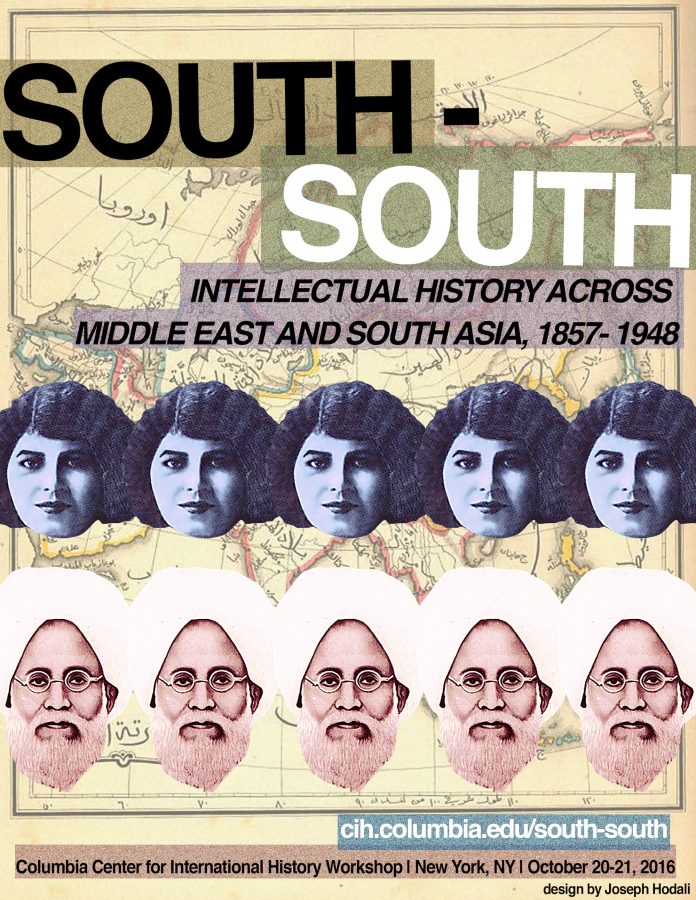
Columbia University Workshop | New York, NY | October 20-21, 2016
Open to the Public
Organizers: Roy Bar Sadeh (Graduate Student, History, Columbia University) and Esmat Elhalaby (Graduate Student, History, Rice University)
Keynote Speakers: Kavita Datla (Associate Professor of History, Mt. Holoyoke) and Umar Ryad (Associate Professor of Islamic Studies, Universiteit Utrecht)
Despite historiographical overtures to the global, and spirited polemics decrying area studies’ analytical limits, something called South Asia and another thing called the Middle East persistently structure—and stricture—scholarly inquiry in the academy and beyond. Accounts of Indian or Arab intellectual production in the nineteenth and twentieth centuries often confine themselves to non-European confrontations with European epistemologies, capital, and guns. With the critiques of Orientalism, modernization theory, and Westernization having complicated triumphalist narratives of this encounter, serious attention to south-south intellectual histories remains rare. Early modernists are often the most cogent critics of the modernist scholars’ Eurocentrism, tracing connections between the Middle East, South Asia, and elsewhere that bypass Europe. Yet Europe’s hegemony in the modern world’s political economy and imagination did not preclude profound inter-connections between the non- European world. In fact, the conditions of global European capital made new engagements between the colonized and peripheral world necessary.
The workshop aims to raise a set of interdisciplinary historical, historiographical and theoretical questions: What kinds of significant geographies are produced, traversed and imagined in the nineteenth century and after between the Middle East and South Asia? Does the presence of a shared Islamicate past adequately explain Indian and Arab Muslim affiliations? How are the Jewish, Christian, Zoroastrian and Hindu intellectual communities part of this Islamicate? How is modernist thought or critiques of secularism or theories of anti-colonialism related in this unwritten history of Asian intellectual interaction? What role did political economy of colonialism play in restructuring the conditions of the early modern’s “connected histories”? What new networks of intellectual exchange and new patterns of racialization emerged? How do we historically recuperate these South-South histories without succumbing to the follies of the post-colonial states?
Schedule
THURSDAY 20 OCTOBER
Location: 411 Fayerweather Hall which is located on the main campus. The directions to the building are found in the following link.
- 4:30 – 4:55: Welcome by Seth Schwartz, Roy Bar Sadeh & Esmat Elhalaby
- 5:00 – 6:15: THEORY FROM THE SOUTH
- Discussant: Eugenia Lean (EALC, Columbia University)
- Sara Marzagora (SOAS), “We Proceed Following Japan”: The Role of the Japanese Model in Early 20th century Ethipoian Political Philosophy
- Osama Siddiqui (Cornell), The Enchantment of Political Economy: Arabic Alchemy and Urdu Economics in Colonial India
- Hussein Omar (Oxford), Occupy Egypt! Diffusion, Derivativeness and Discourse in The History of Anticolonial Ideas
- 6:30-7:30: Keynote Address
Umar Ryad (Utrecht University): “European Converts to Islam between Cairo, Mecca and Indian Muslim Circles in Interwar Europe” - 7:30: Dinner for Participants
FRIDAY 21 OCTOBER
Location: 501 Northwest Corner Building which is located on the main campus. The directions to the building are found in the following link.
- 8:30-9:00: Breakfast/Coffee
- 9:00-10:00: Keynote Address
Kavita Datla (Mt. Holyoke): “Rethinking Decolonization: Hyderabad and the Forgotten Political Possibilities of the Colonial World” - 10:15 – 11:30: WRITING RELIGION
- Discussant: Marwa Elshakry (History, Columbia University)
- Mohsin Ali (UCLA), Islamic Historiography among the Ulama in Colonial India: the Divergent Approaches of Shibli Nu’mani and Abd al-Hayy al-Hasani
- Saif ul Hadi, Transnational Scholarly Networks in Early Modern Hijaz: The Case of Three Indian Hadith Teachers at the Holy Mosque in Medina
- Manjusha Madhu (JNU), From Edessa to Muziris: Printing and Intellectual Traditions of Kerala’s Mar Thoma Christians
- Ramla Wahab-Salman (AILS), Re-visiting Muslim Nesan (1882 -1889): Influences and Struggle upon Ceylon Moor Intellectual Production
- 11:30 – 11:45: Coffee Break
- 11:45 – 1:00: SOUTHERN ROUTES
- Discussant: Anubhuti Maurya (Delhi University)
- Samhita Sunya (Virginia), Travels of Tango at the Edges of Empire
- Alexander Jabbari (UCI), Urdu Beyond its Borders: South Asians’ Role in Iranian Modernity
- Jazmin Graves (Chicago), Mai Mishra’s Boat: Dispersion and Divergence of East African (N)Goma Rituals from Zanzibar to India
- 1:00 – 2:15: Lunch
- 2:15 – 3:30: THE ASIAN AND THE INTERNATIONAL
- Discussant: Rashid Khalidi (History, Columbia University)
- Rephael Stern (Harvard), A Part of Asia or Apart from Asia? Zionist and Israeli Perceptions of Asia, 1939-1956
- Erin O’Halloran (Oxford), The Politics of Disappointment: The Muslim League and the Question of Palestine 1937-1939
- Reem Bailony (Georgetown), Competing Internationalisms and the Syrian Revolt of 1925
- Nova Robinson (Seattle), The All-Asian Women’s Conference and “Oriental” Women’s Rights
- 3:45 – 5:15: ISLAMIC UNIVERSALISM
- Discussant: Michael Laffan (History, Princeton University)
- Melis Hafez (Viginia Commonwealth), Defending a “Wilsonian Caliphate” in the Aftermath of the First World War
- Faridah Zaman (Chicago), Taking the Islamic world for India
- Usman Ahmedani (Amsterdam), ‘L’Orient par L’Islam et L’Islam pour L’Orient?’: Ideas of Eastern and Islamic Unity in Inter-War Egypt
- John Chen (Columbia), Islam’s Loneliest Cosmopolitan: Badr al-Dīn Hai Weiliang, the Lucknow-Cairo Connection, and the Cold-War Fate of Islamic Transnationalism
- 5:15 – 5:30: Coffee Break
- 5:30 – 6:45: SPACE AND SOVEREIGNTY
- Discussant: Manan Ahmed (History, Columbia University)
- Sanjog Rupakheti (Loyola), Law and Modernity on the Margins of the British Empire
- Shuvatri Indu Dasgupta (Presidency), Caught in the Middle (East): Entangling and Revisualizing Geographies
- Aaron Jakes (New School), Comparing against Orientalism: the Telescopic Geographies of Union in the Writings of ‘Abd al-‘Aziz Jawish
- Gregory Maxwell Bruce (UC Berkeley), Roses in Autumn: Encounter and Discovery in Shibli Nomani’s Safarnāmah-e Rūm o Miṣr o Shām
- 7:00: Open Reception